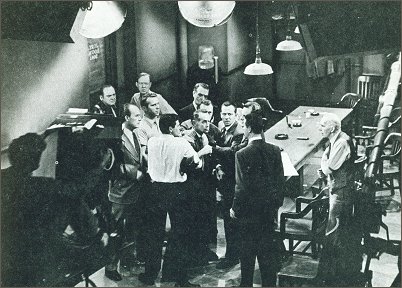
Live TV creates its own unique brand of electricity. We watch Saturday Night Live and American Idol as they happen -- and we see whatever happens. There's no second take, no safety net. We're sharing the same time and (virtual) space as the people staging the show. And that's a direct connection that taped/filmed shows simply can't match.
This urgency once filled TV's comedies and dramas, too, in the medium's early years of the 1940s and 1950s, before videotape was perfected. That's why I love watching old before-my-time shows, even in the poor quality afforded by filmed-off-a-TV-monitor kinescopes. The programs still sizzle with the adrenaline of a cast and crew who had one shot to get it right.
Some of the programs they got especially right are still legendary. And now the Emmy-staging TV academy's Archive of American Television is making sure we understand why. In tandem with DVD distributor E1, they're releasing live TV originals like Twelve Angry Men, which hits stores today, along with early tube work from writers like Rod Serling and performers like Orson Welles.
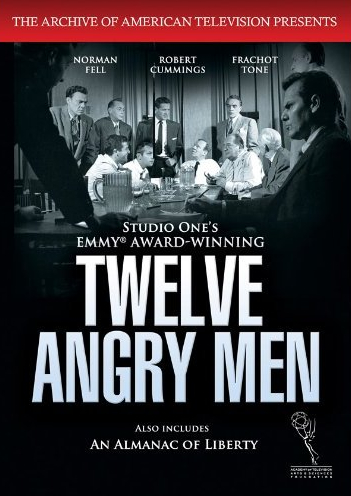 Twelve Angry Men is mostly known now through the 1957 theatrical movie starring Henry Fonda -- but it was written for live TV in 1954, to star Robert Cummings (pre-Love That Bob and post-Hitchcock's Saboteur), as a presentation of the eminent anthology drama series Studio One. The TV version was long thought lost, then finally resurfaced in not-bad-quality kinescope form to provide an intriguing comparison to the familiar film. The story's tense jury room showdown is actually better suited to the small-screen medium, with its claustrophic studios feeding the bulky boxes inside '50s homes. And Cummings is more an everyman than Fonda, playing the lone-holdout character facing down bully-boy jurors tautly defined on the tube by Franchot Tone and Edward Arnold.
Twelve Angry Men is mostly known now through the 1957 theatrical movie starring Henry Fonda -- but it was written for live TV in 1954, to star Robert Cummings (pre-Love That Bob and post-Hitchcock's Saboteur), as a presentation of the eminent anthology drama series Studio One. The TV version was long thought lost, then finally resurfaced in not-bad-quality kinescope form to provide an intriguing comparison to the familiar film. The story's tense jury room showdown is actually better suited to the small-screen medium, with its claustrophic studios feeding the bulky boxes inside '50s homes. And Cummings is more an everyman than Fonda, playing the lone-holdout character facing down bully-boy jurors tautly defined on the tube by Franchot Tone and Edward Arnold.
As was typical with '50s live TV dramas, Reginald Rose wrote the play directly for television, based on his own experience serving on a jury. That's explained in the E1 DVD's fine 16-page booklet, a standard inclusion with these enlightening Archive releases. Rose's essay on the tale is supplemented with a smart look back at the studio production itself, and there's an on-disc introduction to the play that puts Studio One in historical perspective. (Also included on the Twelve Angry Men disc is Rose's Studio One play An Almanac of Liberty, a more heavyhanded allegory delivered as a rebuke to the era's blacklist demonization.)
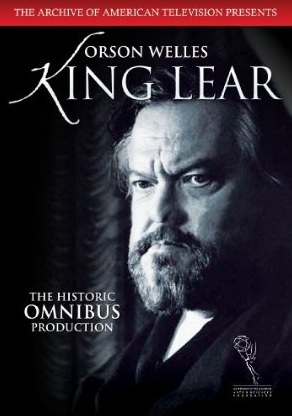 Even more effort went into E1's new DVD of 1953's
Even more effort went into E1's new DVD of 1953's
King Lear, with Orson Welles starring and Virgil Thomson providing music as part of that decade's acclaimed arts series Omnibus. The Lear production, with Welles recognizable mostly by his voice underneath some ungainly aging makeup (12 years past Citizen Kane, he was still only 38), is not the DVD's only treat. Its many extras demonstrate how the nascent TV networks were dedicated not just to serving the lowest common denominator for the highest ratings, but also to expanding viewers' horizons now that the entire world could suddenly be beamed into their living rooms. (OK, so the networks weren't entirely noble. They also needed the prestige of shows like Studio One to balance all the wrestling matches and shoot-'em-ups they were otherwise purveying.)
The E1 disc holds an additional 90 minutes of vintage bonus features delving into Shakespeare -- an engagingly lively introduction to the Bard by Dr. Frank Baxter (an English professor who was early TV's go-to specialist for explaining learned things to the masses), an Alistair Cooke remote broadcast from the Yale Shakespeare Festival, critic Walter Kerr discussing staging, and a backstage preview of Lear from the previous week's Omnibus. (Watch the DVD trailer here.)
Another superb booklet offers essays from young Lear stager and eventual stage giant Peter Brook and from next-generation actor/director Simon Callow, placing both the mercurial Welles and this stunning production in vivid historical context.
Also new in E1's Archive series is a
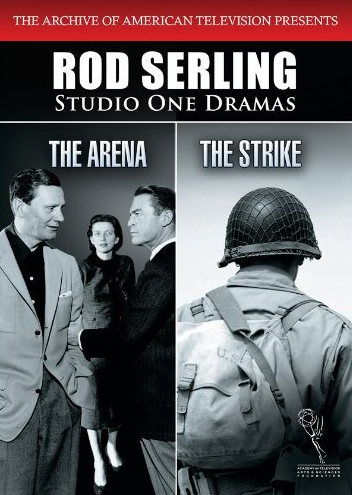 Studio One double feature from Rod Serling, who long before The Twilight Zone had made his name as a young television writer of such enduring classics as the backstage TV power struggle Patterns. Here, his 1954 political tale The Arena portrays a freshman senator who gets the goods on a elder rival and must decide whether to drag the man through the mud. The Strike stars James Daly (Medical Center, father of Tyne and Tim) as a Korean War officer faced with his own defining dilemma, when he's ordered to begin an attack he knows will kill many of his men. Both are illuminated by a personal essay from Serling's daughter, Anne, exploring what her father hoped to accomplish with these provocative scripts, and how their impact fueled his move into the fantasy allegory of Twilight Zone.
Studio One double feature from Rod Serling, who long before The Twilight Zone had made his name as a young television writer of such enduring classics as the backstage TV power struggle Patterns. Here, his 1954 political tale The Arena portrays a freshman senator who gets the goods on a elder rival and must decide whether to drag the man through the mud. The Strike stars James Daly (Medical Center, father of Tyne and Tim) as a Korean War officer faced with his own defining dilemma, when he's ordered to begin an attack he knows will kill many of his men. Both are illuminated by a personal essay from Serling's daughter, Anne, exploring what her father hoped to accomplish with these provocative scripts, and how their impact fueled his move into the fantasy allegory of Twilight Zone.
Like Twelve Angry Men, the Serling plays are compact, concentrated one-hour dramas (the Welles King Lear is compressed into an hour and a half), exhibiting rougher production values and a plainer directness of expression than today's viewers are used to. At the same time, they delve deeper into men's minds and motivations, if not their souls, as the protagonists face crucial moments that will define their lives to both others and themselves. Cameras stay tight on the performers' faces to reveal thoughts and emotions that seem to well up from the characters' very guts.
Part of that is performance power we could see on any stage or in any film. But part of it undoubtedly spills out of the air-time tension of dodging behemoth cameras, stepping over monster cables, and racing behind set walls to the next set in cramped New York City studios, trying to hit precise marks at the right second to make the production end at the same exact minute as the TV hour -- all of it viewed by millions of Americans at that very instant. Even west coast viewers who watched on kinescope delay would be seeing that same single performance. The cast and crew had to nail it -- opening night and closing night combined.
And they were making it up as they went along -- not the story or dialogue, but the art form itself, the television play, an especially dynamic amalgamation of film, stage and radio whose impact and intimacy are little known (and little matched) today. The intimate close-ups, the fluid camerawork, the crackling energy 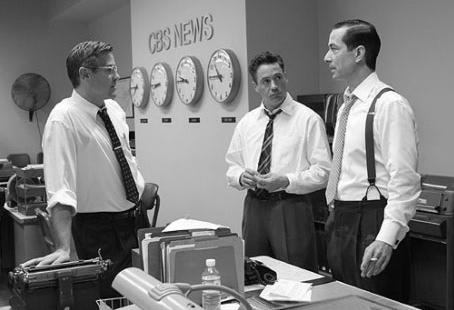 -- and, most of all, the psychological ambition of probing men's hearts and minds -- that's why you see stars of today like George Clooney yearning to revive this instantaneous model. Clooney seems to wish he could beam himself back to this era, having spearheaded renewed attempts at live TV drama in 2000's CBS Fail Safe remake and created such admiring look-backs as the 2005 movie Good Night, and Good Luck.
-- and, most of all, the psychological ambition of probing men's hearts and minds -- that's why you see stars of today like George Clooney yearning to revive this instantaneous model. Clooney seems to wish he could beam himself back to this era, having spearheaded renewed attempts at live TV drama in 2000's CBS Fail Safe remake and created such admiring look-backs as the 2005 movie Good Night, and Good Luck.
I know where he's coming from. When I'm immersed in the power of these productions, I can imagine myself amid the invention of such a galvanizing art form. It's no wonder that an entire generation of directors schooled in live TV drama -- John Frankenheimer, Sidney Lumet, Delbert Mann, and Franklin Schaffner, who directed the two Serling dramas more than a decade before his Oscar-winning Patton -- would bring that earnest precision to the big screen at a time when post-studio-era Hollywood so desperately needed to reinvent itself. These directors brought along the purpose of those dramas, too, to examine human behavior and reveal larger truths, not merely to entertain but to say something.
Those aspirations -- and the pioneer ingenuity to achieve them despite early TV's lack of time, money and precedent -- also contribute to an enduring immediacy in these live TV dramas that smoothes over any blundered lines or camera wobbles. (Or, to modern eyes, the distancing quality of black-and-white kinescopes. Remember that these live productions were originally broadcast with the same video clarity as news, sports or American Idol.)
Also retaining their urgency, on discs like the Serling Studio One pair, are the era's live commercials -- especially Betty Furness' celebrated demonstrations of the wonders of sponsor Westinghouse's steam irons, refrigerators and matched washer-dryer sets. The spots are plain and slow-moving. Yet somehow, also, a high-wire act that's utterly riveting.
Just as riveting as the plays whose budgets they provided.
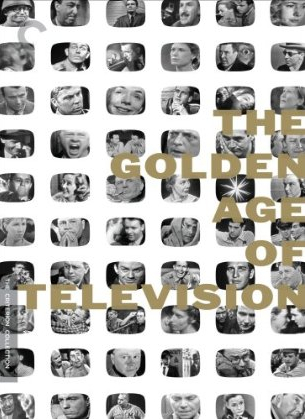 You can dive even deeper into live TV drama with two larger DVD compilations of 1950s productions:
You can dive even deeper into live TV drama with two larger DVD compilations of 1950s productions:
--- The Archive's Studio One Anthology (currently an Amazon bargain at $32) includes Twelve Angry Men, The Arena, The Strike and 14 other vintage TV plays by writers like Gore Vidal, plus on-disc interviews and a richly informative 52-page booklet.
--- The Golden Age of Television (currently $40 at Amazon) collects eight plays from various anthology series, including such timeless originals as Marty, Requiem for a Heavyweight, Days of WIne and Roses, and Serling's Patterns. (The movies would steal plenty from TV in its infancy.) This Criterion Collection set also offers a golden bounty of interviews conducted for the plays' 1980s PBS re-airings, along with immersive commentaries from directors Mann, Frankenheimer (his visceral recollections of 1957's The Comedian starring Mickey Rooney are a drama in themselves), Ralph Nelson and Daniel Petrie. And, of course, the set has its own 36-page booklet, reliving an era and a body of work that TV today, for all its achievements, has yet to match in production ingenuity and emotional impact.